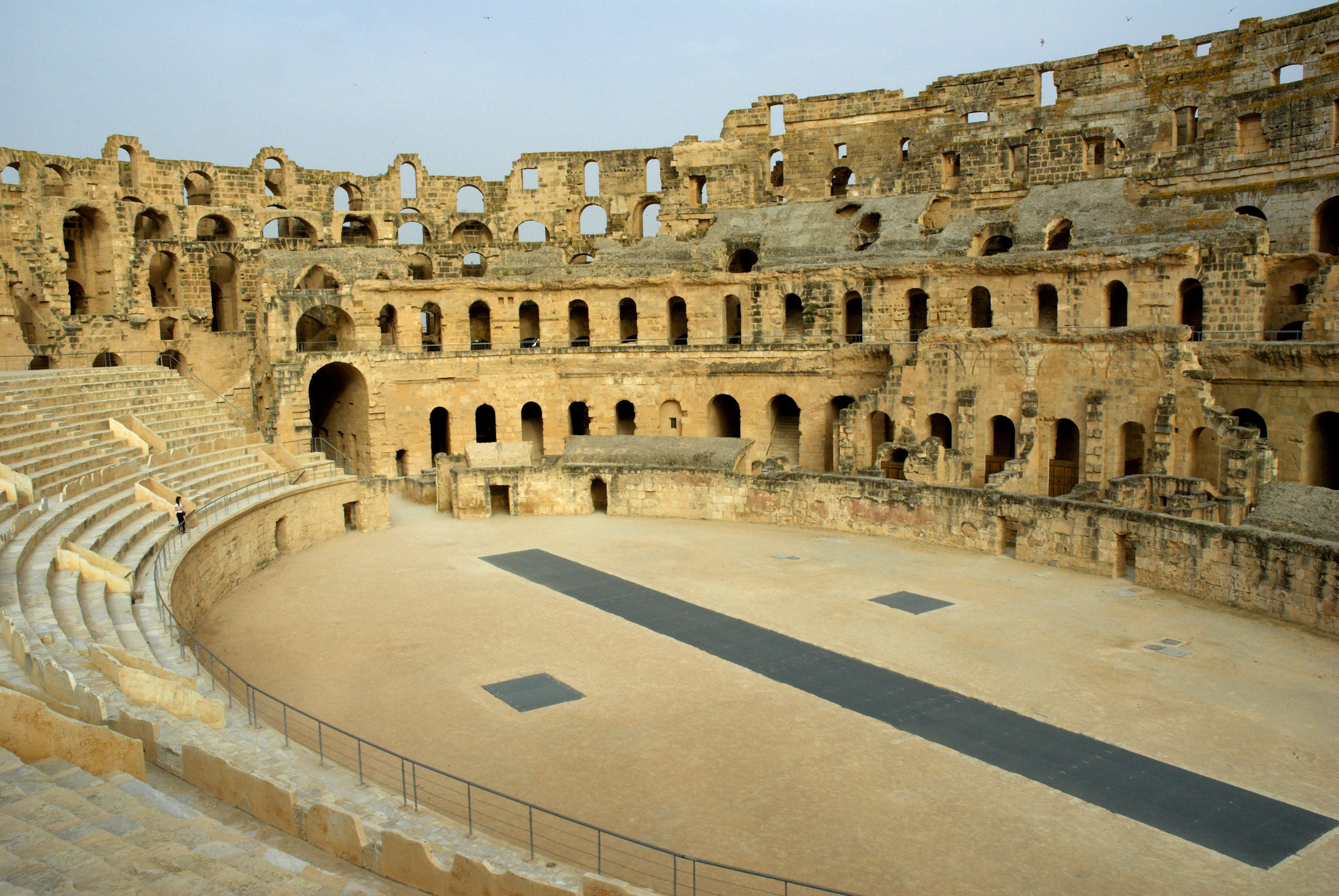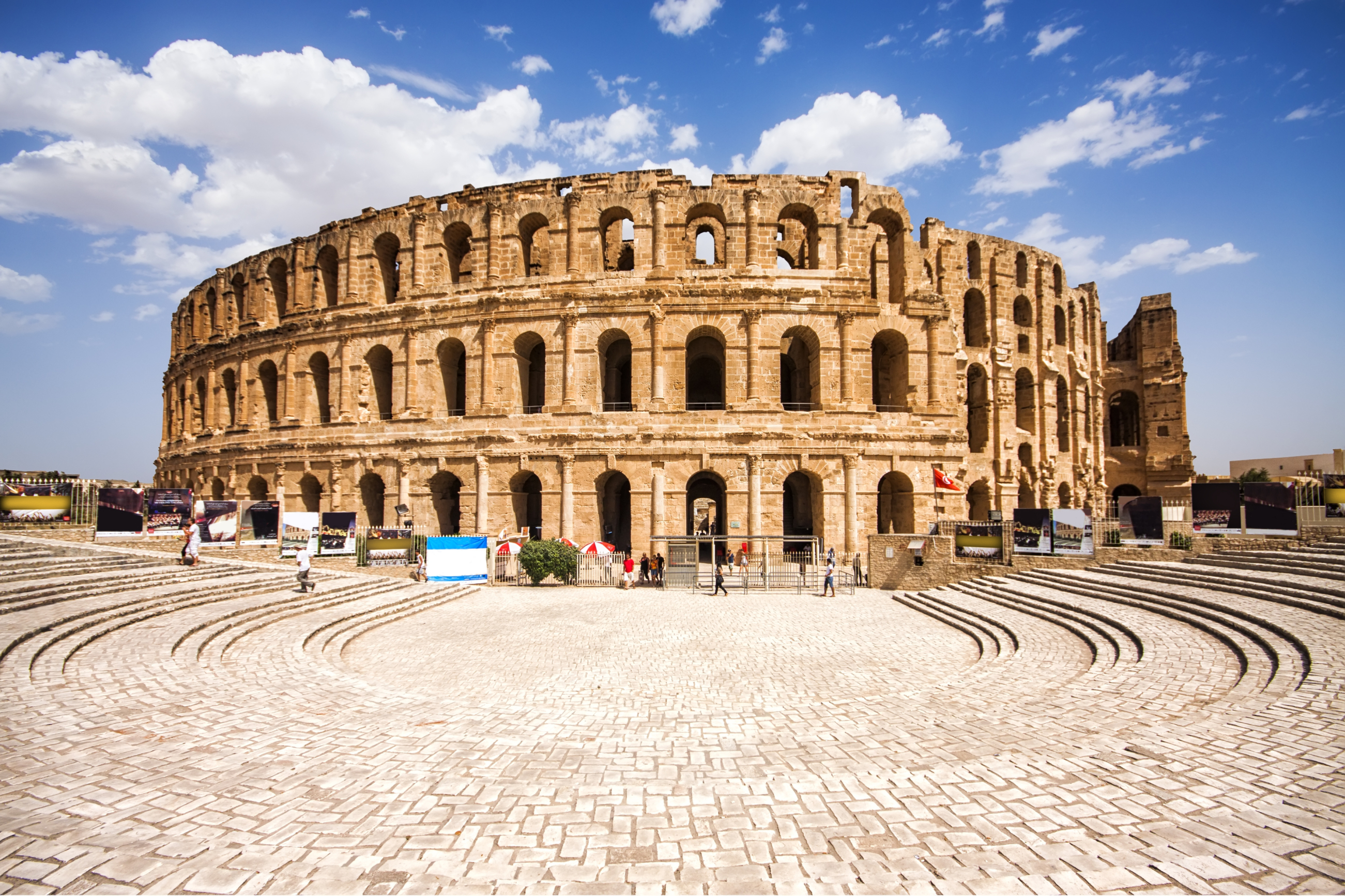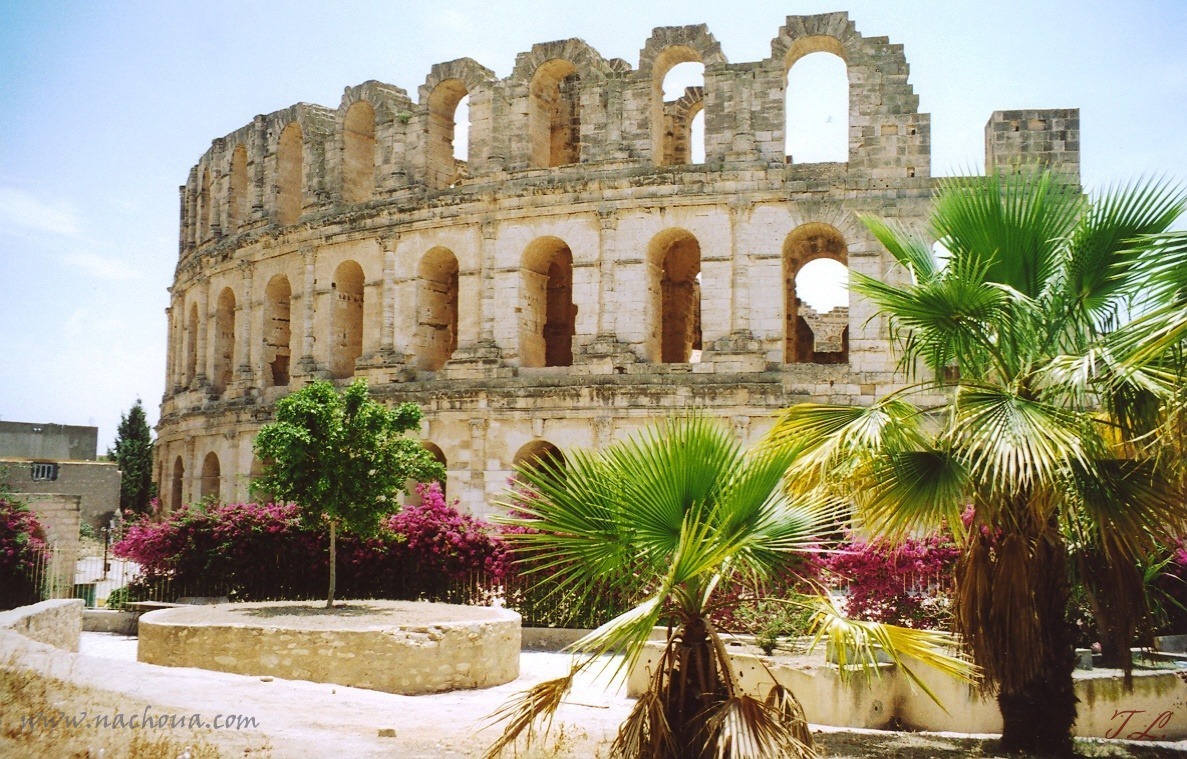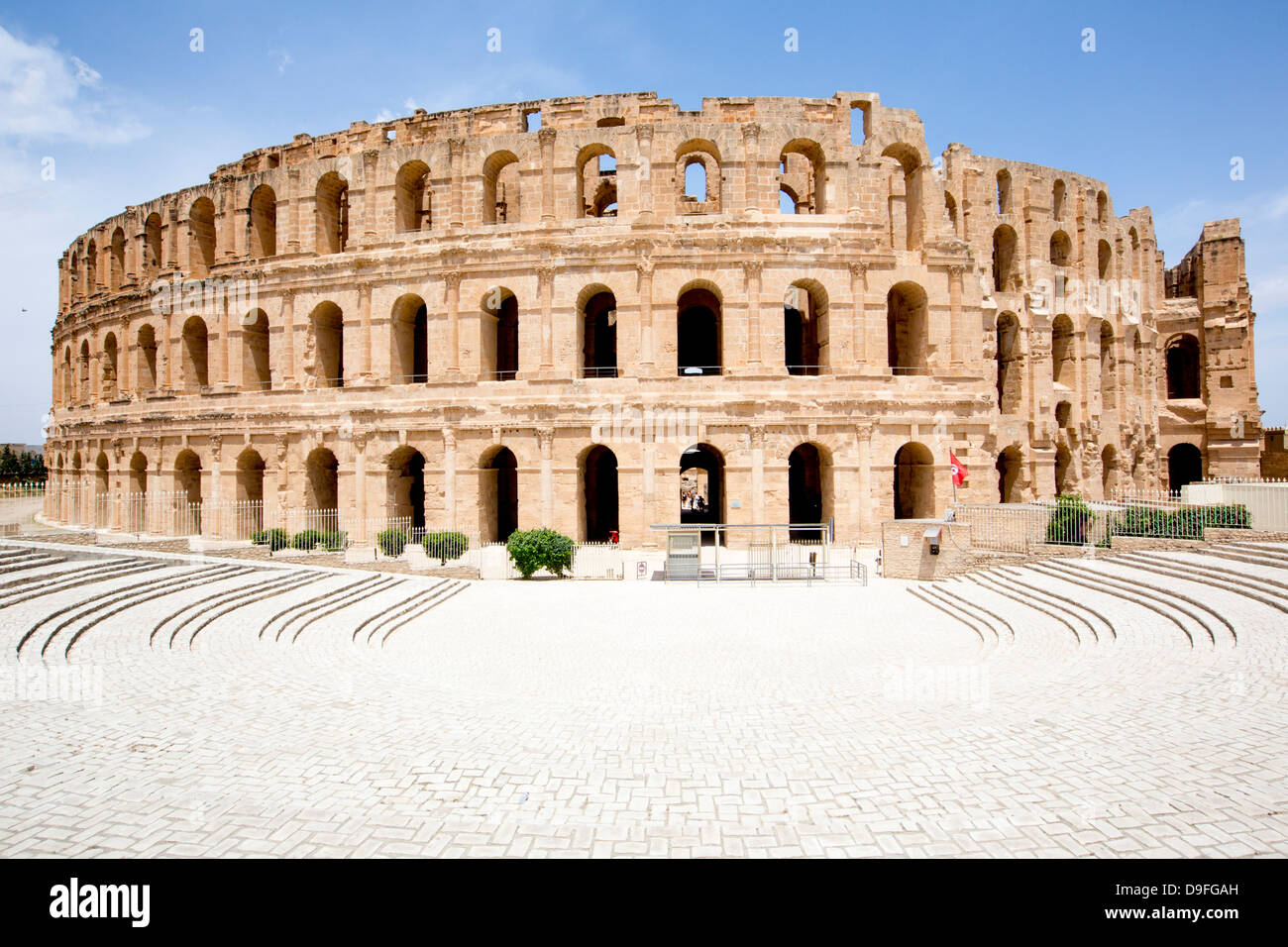
Seconda tappa El Jem colosseo eljem eljemcolosseum tunisia
How El Jem got its Amphitheater. There are only two monuments in the world today that are larger than El Jem. One is obviously the Colosseum in Rome and the other is Capua which is near Naples and is actually in worse condition. Both were built in the Roman heartlands in modern day Italy. What you have in El Jem is the largest stadium of the.

El Jem Colosseum Tunisia Stock Photo Download Image Now iStock
In this vlog, we're visiting El Jem (or El Djem), Tunisia. This city in the center of Tunisia is home to one of the largest and best-preserved Roman coliseum.

El Jem Tunisia
El Jem's mighty amphitheater is the fourth largest in the Roman world, only coming after Rome's Colosseum; the Pozzuoli amphitheater near Naples; and the one at Carthage, of which little survives. Its colossal size and excellent preservation has given it the nickname the African Coliseum. Oval in form, the amphitheater is 149 meters long by 122.

Colosseo in ELJem, Tunisia Immagine Stock Immagine di storia
The Amphitheatre of El Djem (Wikimedia Commons) The Amphitheatre of El Djem is a free-standing monument, and is built entirely of stone blocks without foundations. It is said that in these respects, it is modelled after the Colosseum in Rome. Whilst the Colosseum holds the title for being the largest Roman amphitheatre, the Amphitheatre of El.

ALLA SCOPERTA DI MADHIA, ANTICA CAPITALE DELLA TUNISIA
Oct 2022. Arriving in El Jem, you can't help but admire the magnificent Amphitheater. The Amphitheater of El Jem is an oval amphitheater in the modern-day city of El Djem, Tunisia, formerly Thysdrus in the Roman province of Africa. The amphitheater here in El Djem was built by the Romans under proconsul Gordian, who was acclaimed emperor at.

El Jem Amphitheatre El Jem, Tunisia Attractions Lonely
Built in the 3rd century, two centuries after Rome's Colosseum, El Jem's amphitheater is better designed and more elaborate: less blind spots, more fluid access, basements better arranged…. In Rome, the amphitheater was sometimes filled with water in order to showcase naval battles. But in El Jem, because of the lack of water, such shows.

Ancient Colosseum in El Jem, Tunisia Stock Image Image of ancient
Manuale. L' anfiteatro romano di El Jem è un anfiteatro nella moderna città di El Jem, in Tunisia (antica Thysdrus ), spesso chiamato erroneamente colosseo poiché era in grado di ospitare 35 000 spettatori seduti. Solo il Colosseo di Roma, con più di 50 000 posti a sedere, e l' Anfiteatro campano di Capua erano più capienti.

Coliseum of ElJem in Tunisia Par rimkouze Amphitheater, Carthage
This majestic structure located in El Jem (or El Djem), a small village in the East of Tunisia, which was known back in Roman times as Thysdrus, continues to remain Roman's greatest architectural legacy in North Africa and the Middle East. El Jem Amphitheatre was built around 238 AD. This giant architectural and artistic creation is built.

Fascinating Monuments Of Tunisia The Amphitheatre At El Jem Tunisien
A little more than 200km from the Tunisian capital, Tunis, is one of humanity's most majestic creations and one of the greatest Roman ruins in the world.. For almost 18 centuries, the Roman Colosseum of El Jem - built in the third century AD - was witness to several turning points in Tunisian and global history.. Today, in a small town on the Tunisian coast and in the middle of modern.

EL JEM AMPHITHEATRE , EL DJEM COLOSSEUM TUNISIA YouTube
Amphitheatre of El Jem. The impressive ruins of the largest colosseum in North Africa, a huge amphitheatre which could hold up to 35,000 spectators, are found in the small village of El Jem. This 3rd-century monument illustrates the grandeur and extent of Imperial Rome. Description is available under license CC-BY-SA IGO 3.0.

Colisée ElJem en Tunisie, patrimoine mondial de l'Unesco
Image via Wikimedia Commons. When Rome conquered Carthage in the Third Punic War (149-146 BC), the Republic renamed the region Africa, for Afri, a word the Berbers used for local people in present-day Tunisia.(The Arabic word for the region was Ifriqiya.)Thereafter would the Roman Empire have a stronghold in North Africa: Carthage, the capital.

Roman Colosseum at El Jem, Tunisia Loved it more than Rome! Oh the
Unsourced material may be challenged and removed. "El Djem" -. El Jem Tunisian Arabic الجمّil-Jamm) is a town in Mahdia Governorate Tunisia. Its population was 21,576 during the 2014 census. It is home to remains, including the Amphitheatre of El Jem. The Roman city of Thysdrus was built, like almost all settlements in ancient Tunisia.

Roman Coliseum in El Jem Tunisia Stock Photo Alamy
El Jem Amphitheatre. Tunisia, Africa. Top choice in Tunisia. This Unesco World Heritage-listed colosseum was the second-largest in the Roman world (after Rome's); it was 149m long by 124m wide, with three tiers of seating 30m high. Its seating capacity has been estimated at up to 35,000 - considerably more than the population of the town.

El Jem Colosseum, Tunisia Amphitheater, Travel Tours, Travel
El Jem is regularly compared with the Colosseum in Rome, and it's no surprise why. Large parts of it are accessible, and it has been preserved in a manner which means that you can almost feel as though you are stepping back in time and imagining lions and chariots gallivanting by. Back when it was first built, it had a capacity of up to.

Ancient Colosseum in El Jem, Tunisia Stock Image Image of colosseum
El Jem, Tunisia. The largest and best-preserved Roman amphitheater in Africa was designed to seat 35,000 people. Been Here? 196.. Located in the city of El Jem (or El Djem), which was known.

Colosseum, El Jem, Tunisia Royalty Free Stock Photography Image 3342687
The Amphitheatre of El Jem in Tunisia is listed as a World Heritage Site by UNESCO and is actually the fourth largest Roman amphitheater in the world. It is one of the best-preserved and most impressive Roman remains in Africa. The ancient amphitheater sits amidst the arid Tunisian countryside close to the city of El Jem and has been a popular.